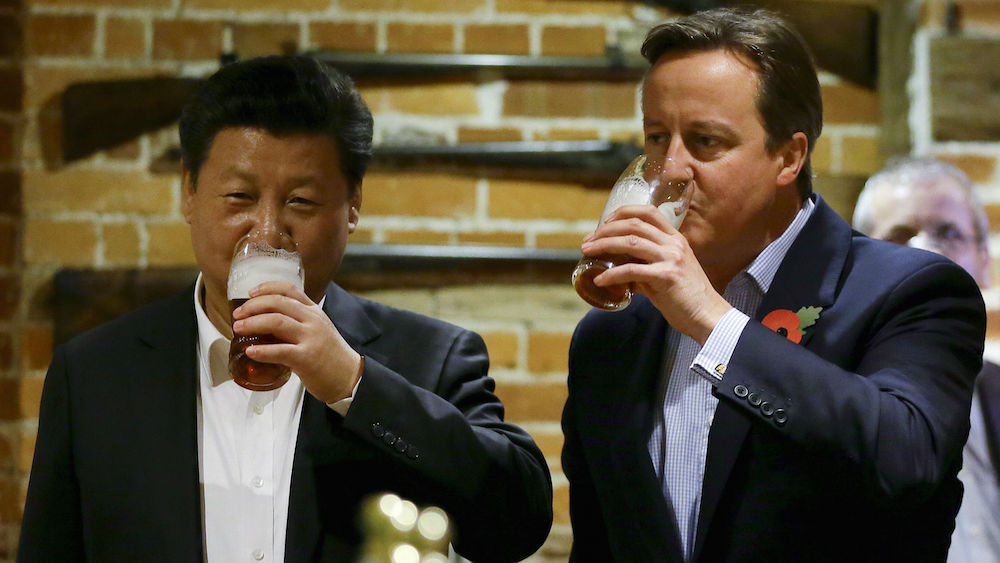Britain’s government under Prime Minister David Cameron is determined to strengthen ties with China, a push that, in the midst of an economic slowdown, is welcome in Beijing. However, Britain could wind up paying for Chinese stimulus money with reduced maneuverability in Asia.
As it moves away from Deng Xiaoping’s advice to “hide its brilliance and bide its time” in favour of a foreign policy more in keeping with its economic weight, China is steadily expanding its reach abroad – and not just in its traditional relations with countries that supply it with resources, but also further afield in Europe. And Britain, for its part – though its trade with the People’s Republic remains well below that of Germany and France – is making every effort to prove itself “China’s best friend” on the continent, as Prime Minister David Cameron and Chancellor of the Exchequer George Osborne put it when Chinese President Xi Jinping made a state visit to the United Kingdom in October.
For Osborne, Chinese investment offers are a godsend, as he is currently facing the quandary of reducing the budget deficit while meeting election pledges to increase spending on infrastructure. It remains to be seen how well these investment offers will translate from the big numbers thrown around during the visit – totaling tens of billions of pounds sterling – into real and complete projects in regional regeneration, a high-speed train link between London and Birmingham, and nuclear power stations on the west and east coasts; the rail link in particular has aroused widespread opposition from people living along the route, and the price of electricity generated by the nuclear stations seems likely to be high, quite apart from questions about the reliability of the technology to be used, especially if China builds a station in eastern England. But there is no doubting the enthusiasm the government is showing for its Chinese connection. It has been careful not to mention sensitive subjects such as human rights after Beijing expressed its disapproval of Cameron’s 2012 meeting with the Dalai Lama.
The rapprochement between London and Beijing, which Osborne calls a “golden age” of Sino-UK relations, fits into a pattern of a more expansive Chinese foreign policy at a time when the country is suffering a slowdown in economic growth. With relations with the United States frozen by disputes ranging from freedom of navigation to cyber espionage, the People’s Republic wants to find new friends across the globe. It has launched the “One Belt, One Road” initiative, along with other programs to dispense aid and investment to countries including South-East Asia, Russia, Pakistan, Brazil, and the -Stans of Central Asia.
For Britain, as well as inviting a flow of investment funds from the world’s second largest economy, the hope is that the City of London will become the predominant Western center for trade in the Chinese currency. For Beijing, there are economic motives for the investment: in particular, it should provide orders for companies that are suffering from the economic slowdown on the mainland and want to export some of their export capacity. It should also be seen as one step in the Xi administration’s broader efforts to extend its foreign policy reach beyond Asia.
The Chinese president’s visit to the United States In October for a summit with President Barack Obama produced little in the way of meaningful agreements, and the American navy subsequently sailed a destroyer around South China Sea reefs on which China has built military bases in water claimed by the People’s Republic. There is a trust deficit between the two powers, leading China to try to strengthen relations with European countries.
Internationally, China can now rely on Britain to tacitly approve its actions – for instance in Tibet, or even Taiwan should cross-Strait relations grow more tense following the likely victory of the Democratic Progressive Party (DPP) in the Taiwanese presidential election in January. Russia, China’s other new friend, and Britain are both permanent members of the United Nations Security Council, so the People’s Republic will have enough friends to be able to deflect critical motions at the international body.
In Europe, Britain can be expected to support the free trade agreement Beijing wants and grant China market economy status, which would make anti-dumping measures more difficult. The People’s Republic has also been seeking to strengthen ties with other major European countries – French President François Hollande and German Chancellor Angela Merkel have both just visited China. Their two countries enjoy much higher trade with the mainland than Britain, but they also take a less mercantilist approach to the relationship than Cameron and Osborne: Merkel used her visit to talk to Chinese leaders about Syria and the European refugee crisis, while for Hollande the UN Conference on Climate Change in Paris was the core issue of discussion with Xi Jinping. Both leaders want to leverage their countries’ commercial link with China to develop a broader political relationship in which each side speaks frankly without letting the financial aspects of the relationship predominate; Merkel even had a special meeting in Beijing with human rights activists and political dissidents.
Britain, on the other hand, has chosen to limit its relationship to economic links, an area in which China clearly has the strongest hand. It says it will act as Beijing’s advocate in Europe, a role which is bound to have an impact of foreign policy; for instance, in any dispute between China and Japan, would the UK feel free to back Tokyo if it felt Japan had the stronger case? Cameron and Osborne may regard the short-term benefits of an influx of Chinese money as justifying any longer-term political price. But, unlike Merkel, they have tied their hands in advance, and signalled a decline in their country’s global freedom of action.







